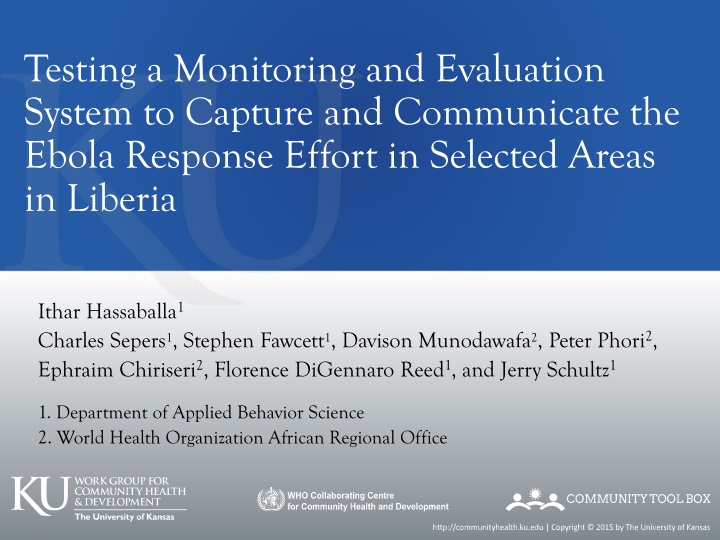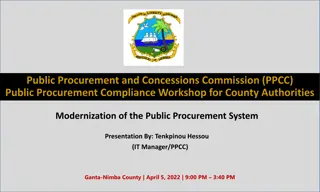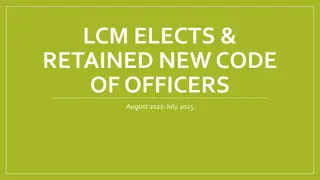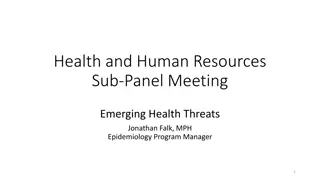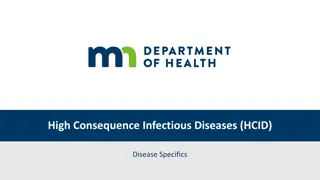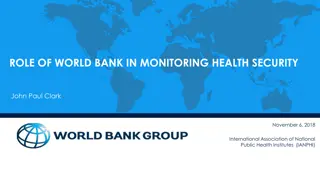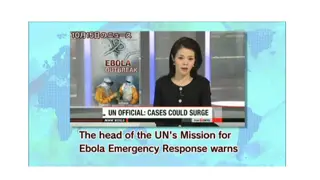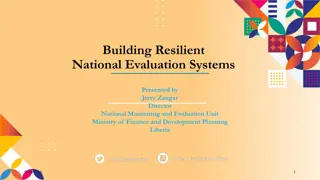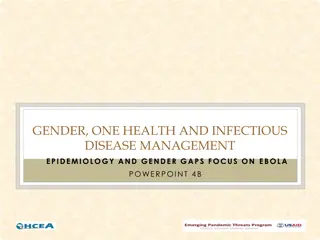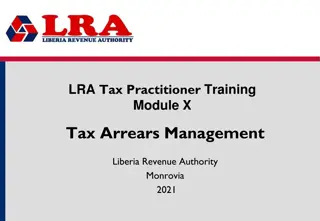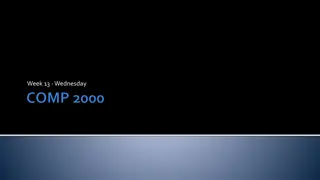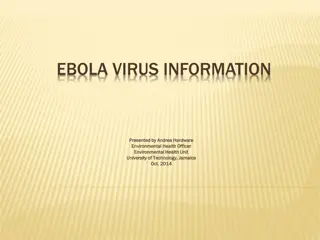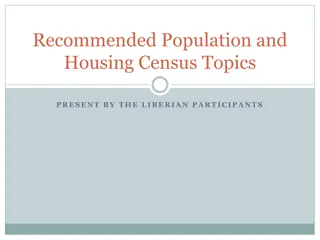Testing Monitoring and Evaluation System for Ebola Response in Liberia
This study focuses on testing a monitoring and evaluation system to capture and communicate the Ebola response effort in Liberia. The research, conducted by a team of experts from various organizations, emphasizes the importance of effective monitoring and evaluation in public health crises like the Ebola outbreak in West Africa. It highlights the challenges faced during the outbreak and the innovative approaches taken to address them.
Download Presentation

Please find below an Image/Link to download the presentation.
The content on the website is provided AS IS for your information and personal use only. It may not be sold, licensed, or shared on other websites without obtaining consent from the author.If you encounter any issues during the download, it is possible that the publisher has removed the file from their server.
You are allowed to download the files provided on this website for personal or commercial use, subject to the condition that they are used lawfully. All files are the property of their respective owners.
The content on the website is provided AS IS for your information and personal use only. It may not be sold, licensed, or shared on other websites without obtaining consent from the author.
E N D
Presentation Transcript
Testing a Monitoring and Evaluation System to Capture and Communicate the Ebola Response Effort in Selected Areas in Liberia Ithar Hassaballa1 Charles Sepers1, Stephen Fawcett1, Davison Munodawafa2, Peter Phori2, Ephraim Chiriseri2, Florence DiGennaro Reed1, and Jerry Schultz1 1. Department of Applied Behavior Science 2. World Health Organization African Regional Office
Presenter Disclosure No conflict of interest.
Presentation Map WHO Collaborating Centre at KU (KU CC) Capturing and Communicating the Ebola Response Effort Background Methods Context & Partners Ebola Response Effort Monitoring & Evaluation Approach Results Sensemaking Discussion Lessons Learned Recommendations for Practice Conclusion
KU Work Group for Community Health & Development Designated as a WHO Collaborating Centre in 2004 Provides: Support for building capacity through the Community Tool Box Training & technical assistance on M&E Guidance to WHO Regional Offices
Responding to the Needs of WHO Regional Office for Africa WHO Tasked with: Monitoring & Evaluating the Ebola Response Effort KU CC Monitoring & Evaluation Capabilities
Background Ebola Outbreak in West Africa Ebola Outbreak Longest and largest in history of disease Enormous health, social, and economic consequences Intense Transmission Delayed identification of the disease Denial, Fear, & Panic False rumors Limited understanding of the disease Little to no capacity for diagnosis and treatment Community Health Volunteers provided home-based care
Methods Context & Partners Participating Communities Collaborating Partners: KU CC, WHO AFRO Intersectoral Action to address the Ebola outbreak Local, national, regional, and international organizations
Methods Ebola Response Effort Focused on Changing the Conditions: 1) Reduce exposures Chlorinated water buckets for sanitation Safe burials 2) Address vulnerabilities/capabilities Education about Ebola Training on protective behaviors Community engagement efforts 3) Reduce differential consequences Provide access to Ebola diagnosis and treatment Engage Ebola survivors
Methods Ebola Response Effort Intervention Components 1) Situation Assessment 2) Community Organization & Mobilization 3) Preparing the Workforce Training & Capacity Building 4) Health Information Communication 5) Delivery of Essential Services & Supports 6) Environmental Changes 7) Policy Changes 8) Health System & Community Transformation
Methods MeasurementCapture KU CC Designed M&E System Liberia-based evaluation consultant Trained using an Evaluation Codebook KU CC team member provided feedback on monthly reports (secondary observer) Accurate characterization of activities or interobserver agreement was at 92% WHO Analysis Computing incidence of Ebola Combining instances of confirmed, suspected, and probable cases
Methods Monitoring & Evaluation Approach Dissemination Efforts
Results Continued Decline in incidence of Ebola Reported zero cases continuously for a period 42 days. World Health Organization Declared Liberia Ebola Free on 09 May, 2015 Declared Liberia Ebola Free (for the second time) on 03 September, 2015
DiscussionLessons Learned Community engagement critical in bringing about community/system changes Intervention required sustained and coordinated intersectoral action WHO s convening power Using an an M&E system was important in capturing key activities
DiscussionRecommendations for Practice Strengthen the local health system Build capacity and sustain leadership through training & technical support Establish an Africa-based forum not one outside the continent Address social determinants that are the root causes of outbreaks Reduce differential exposures (e.g., poor housing, sanitation) Address vulnerabilities/capabilities (e.g., through primary education for girls) Reduce differential consequences (e.g., provide universal access to diagnosis and treatment)
You get what you inspect, not what you expect. Bill Foege, House on Fire: The Fight to Eradicate Smallpox (2011)
Community Health and Well Being Health Behaviors Behavioral science Urban planning, Design Anthropology Medicine, Nursing Public Administration Health Care Broader Determinants Public health Education Policy and Law
If you want to go quickly, go alone. If you want to go far, go together. ~African proverb
References 1. United Nations Development Programme. Recovering from the Ebola crisis: A summary report of the United Nations, The World Bank, European Union and African Development Bank as a contribution to the formulation of National Ebola Recovery Strategies in Guinea, Liberia and Sierra Leone, 2015. [Internet]. 2015 Mar 12. Available from: http://www.undp.org/content/dam/undp/library/crisis%20prevention/Recovering%20from%20the%20Ebola%20Crisis-Full-Report- Final_Eng-web-version.pdf. Mullan Z. The cost of Ebola. Lancet Glob Health [Internet]. 2015 July 9; available from http://dx.doi.org/10.1016/S2214-109X(15)00092-3. United Nations. Making a difference: The Global Ebola Response: Outlook 2015. 2015 Jan [Internet]. Available from: https://ebolaresponse.un.org/sites/default/files/ebolaoutlook.pdf. WHO. Ebola response roadmap. 2014 Aug 28 [Internet]. Available from: http://apps.who.int/iris/bitstream/10665/131596/1/EbolaResponseRoadmap.pdf?ua=1. Feldmann, H., and Geisbert, T.W. Ebola haemorrhagic fever. The Lancet 377.9768 (2011): 849-862. Fawcett S, Collie-Akers V, Schultz J, Cupertino P. Community-based participatory research within the Latino Health for All Coalition. J Prev Interv Community. 2013; 41.3:142-154. Fawcett SB, Sepers CE, Jones J, Jones L, McKain W. Participatory evaluation of a community mobilization effort to enroll residents of Wyandotte County, Kansas residents through the Affordable Care Act. Am J Public Health. 2015; 105 (S3):S433-437. Fawcett SB, Schultz J. Community-based participatory research for health: From process to outcomes. NewYork: Jossey-Bass. 2008. Appendix 1, Using the Community Tool Box's Online Documentation System to support participatory evaluation of community health initiatives; p. 419-430. WHO. Ebola situation report. 2015 Jan 28. [Internet] Available from: http://apps.who.int/ebola/en/ebola-situation-report/situation- reports/ebola-situation-report-28-january-2015. Dhillon R, Yates R. Building back better: priorities for Ebola-affected countries. Lancet Glob Health [Internet]. 2015 July 9; Available from: http://dx.doi.org/10.1016/S2214-109X(15)00032-7 Liberia Map. https://www.google.com/search?q=lofa+and+margibi+maps&biw=1920&bih=1065&source=lnms&tbm=isch&sa=X&ved=0CAgQ_AUoA2o VChMI0oGbirf-xwIViwuSCh3K5A2D#tbm=isch&q=liberia+map+with+counties&imgrc=-E4PuKMPTWcYnM%3A 2. 3. 4. 5. 6. 7. 8. 9. 10. 11.
Thank you! Ithar Hassaballa ithar@ku.edu
